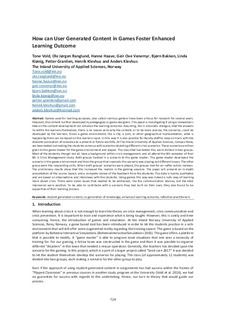How Can User Generated Content in Games Foster Enhanced Learning Outcome
Vold, Tone; Kiønig, Linda Vibeke; Haave, Hanne Marit; Ranglund, Ole Jørgen Stefferud; Venemyr, Geir Ove; Bakken, Bjørn T.
Journal article, Peer reviewed
Published version
Permanent lenke
http://hdl.handle.net/11250/2484705Utgivelsesdato
2017Metadata
Vis full innførselSamlinger
Originalversjon
Proceedings of the 10th European conference on games-based learning. 2017, 724-729.Sammendrag
Games used for learning purposes, also called «serious games» have been a focus for research for several years. However, the content is either developed by pedagogues or game designers. This paper is investigating if using a «dewanian» take on the content development can enhance the learning outcome. Assuming, like in a Socratic dialogue, that the answers lie within the learners themselves, there is no reason as to why the content, or to be more precise; the scenarios, could be developed by the learners. Given a game environment, like a city, a port, or other geographical representation, what is happening there can be based on the learners input. In this way it is also possible for faculty staff to keep on track with the students perception of relevance to a present or future worklife. At The Inland University of Applied Sciences, Campus Rena, we have tested out making the students come up with scenarios depicting different crisis scenarios. These scenarios are then given to the game master for the game environment and played. The class that has tested this, were divided in two groups. Most of the students, though not all, have a background within crisis management, and all attend the 6th semester of their BA in Crisis Management study. Both groups handed in a scenario to the game master. The game master developed the scenario in the game environment and then the group that «owned» the scenario was playing out different issues. The other group were the responding units. When both groups’ scenarios were played, the groups met for an «after action review». The preliminary results show that this increased the realism in the gaming sessions. The paper will present an in-depth presentation of the course layout, and a complete review of the feedback from the students. The data is mainly qualitative and are based on observations and interviews with the students. Using games this way was indeed a ludic way of learning more about crisis. There were some issues that needed to be addressed, like the communication devices, but the total impression were positive. To be able to contribute with a scenario they had built on their own, they also found to be supportive of their learning process.

